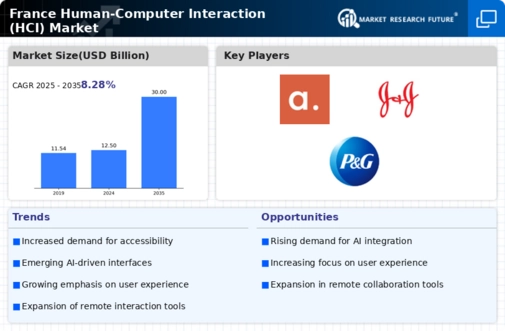Increased Investment in User Research
In the France human computer interaction market, there is an observable increase in investment in user research. Companies are recognizing the importance of understanding user behavior and preferences to create products that resonate with their target audience. This trend is evidenced by a rise in the number of organizations conducting usability testing and user experience studies. Recent data indicates that businesses allocating resources to user research report a 25% increase in customer satisfaction and retention rates. By prioritizing user insights, companies can design more effective interfaces and interactions, ultimately leading to enhanced user engagement. This focus on user research is likely to shape the future of the France human computer interaction market, as organizations strive to meet evolving consumer expectations.
Growing Demand for Intuitive Interfaces
The France human computer interaction market is witnessing a growing demand for intuitive interfaces that enhance user experience. As technology becomes increasingly integrated into daily life, users expect seamless interactions with devices and applications. This trend is reflected in the rise of user-friendly designs that prioritize simplicity and efficiency. According to recent studies, approximately 70% of French consumers prefer products that offer straightforward navigation and minimal learning curves. This demand drives companies to invest in research and development, focusing on creating interfaces that cater to diverse user needs. Consequently, businesses that prioritize intuitive design are likely to gain a competitive edge in the France human computer interaction market, as they can attract a broader audience and foster customer loyalty.
Regulatory Support for Digital Innovation
The France human computer interaction market benefits from robust regulatory support aimed at fostering digital innovation. The French government has implemented various initiatives to promote the development of digital technologies, including funding programs and tax incentives for startups and established companies. For instance, the 'France 2030' plan emphasizes the importance of digital transformation across industries, encouraging investments in human computer interaction technologies. This supportive regulatory environment not only stimulates innovation but also attracts foreign investment, further enhancing the market landscape. As companies navigate these regulations, they are likely to develop more advanced and user-friendly products, thereby contributing to the growth of the France human computer interaction market.
Emergence of Multimodal Interaction Systems
The France human computer interaction market is experiencing the emergence of multimodal interaction systems that combine various input methods, such as voice, touch, and gesture. This trend reflects a growing recognition of the need for versatile and adaptable interfaces that cater to diverse user preferences. As technology evolves, users increasingly expect to interact with devices in ways that feel natural and intuitive. The integration of multimodal systems is projected to enhance user satisfaction and accessibility, particularly for individuals with disabilities. In France, companies that adopt these systems are likely to differentiate themselves in a competitive market, as they offer innovative solutions that improve the overall user experience. This shift towards multimodal interaction is poised to play a crucial role in the future development of the France human computer interaction market.
Advancements in Virtual and Augmented Reality
The France human computer interaction market is significantly influenced by advancements in virtual and augmented reality (VR and AR) technologies. These innovations are transforming how users interact with digital content, providing immersive experiences that were previously unattainable. In France, the VR and AR market is projected to grow at a compound annual growth rate of over 30% in the coming years. This growth is driven by applications in various sectors, including education, healthcare, and entertainment. Companies are increasingly leveraging these technologies to create engaging user experiences, which enhances the overall interaction quality. As a result, the integration of VR and AR into products and services is likely to become a key differentiator in the France human computer interaction market, attracting both consumers and businesses alike.













